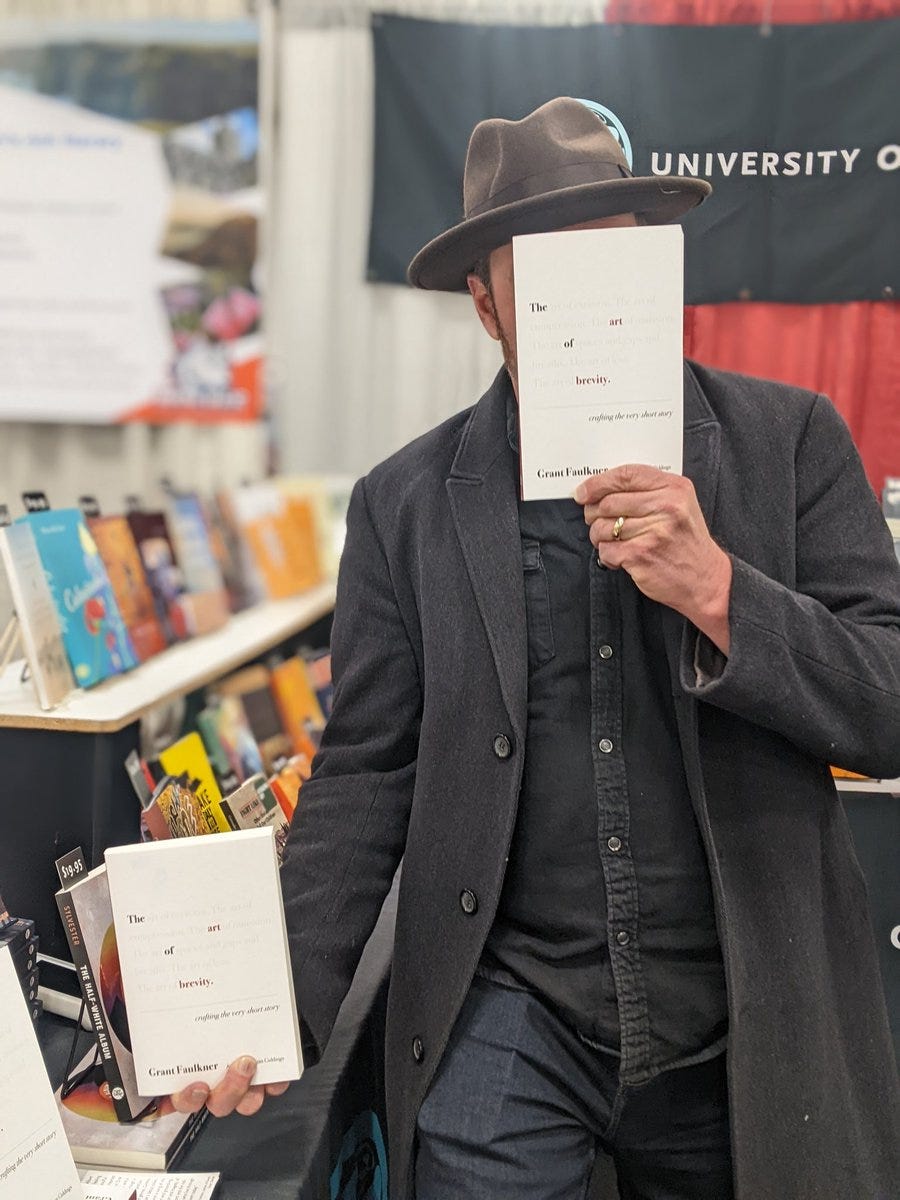So much is to be found in a random moment of invitation.
I had a paradigm-shifting conversation this week (or a paradigm-affirming conversation, rather). Months ago, I read an article, Don’t Just Write a Novel This November. Write a Bad Novel, which took the form of a critique of National Novel Writing Month (aka NaNoWriMo), but it was really a celebration of the act of making art just for art’s sake—all that is sacred and dear to NaNoWriMo.
I initially smarted at the article. The author, Vanessa Zoltan, noted how the NaNoWriMo website touts “successfully published results such as Sara Gruen’s Water for Elephants and Erin Morgenstern’s The Night Circus” as prods to participate—to reassure participants that a month of wacky writing with abandon could lead to commercial success.
But Vanessa said that the lure of “successful” authors was misguided—that the purpose shouldn’t be to publish your book, but to stick it to capitalism (italics mine).
She pointed out how our capitalistic culture values creativity for its commercial possibilities, not as a nourishing and necessary act unto itself, so many of us now create for the wrong reason: as a side hustle aimed at commercial success.
You should sell your wares on Etsy or become such a good baker that you’ll end up on reality TV, which will get you more Instagram followers, which will get you a cookbook deal. Knitting, woodworking, baking: Hobbies that once brought joy to the maker—and to the family and friends who received the resulting socks—are now side hustles, because one job is not enough.
Vanessa’s solution? Create not with the market in mind, but with gusto in mind.
Hence National Novel Writing Month.
Writing a novel is a belief that you being you is, in and of itself, a worthy thing.
She was right, and I needed her message. I wrote Vanessa an email of thanks last November, and then we swapped a few emails, and then we finally talked this past week, and our conversation was wonderful because of the ways it reminded me of the purpose of everything I’m about as a writer and as the executive director of NaNoWriMo: the vital need to find the sacred in the secular (and our stories, specifically).
An Atheist Chaplain?
Vanessa is an “atheist chaplain,” which means that she focuses on how to make life more meaningful without God or religion—because finding the sacred in the secular is a way to see all of the people around us as more sacred (and as a result, maybe we’ll develop the kind of connections that help us save ourselves and the planet).
I can’t tell you how many times I’ve been asked, “What happens to all of those novels in NaNoWriMo?” As if something has to happen to them. As if they’re invalid unless they’re published and money is exchanged. The novel you write isn’t valid because it gets published—your novel is valid because you wrote it.
Because simply being creative is sacred, and thus worthwhile. I urge you to think about this the next time you sit down to create anything, especially if you question the purpose of doing something so “trivial” as being creative: what makes your work worth doing?
“Writing a novel is a belief that you being you is, in and of itself, a worthy thing,” says Vanessa. “It’s faith that even if it never turns into anything but itself, it was worth the time and practice of writing the thing anyway. And that’s something that your job, your boss, and the marketplace really don’t want you to believe.”
Staining the Sacred
This was so refreshing because NaNoWriMo sometimes receives critiques. I don’t know why people want to tear down an event that helps people tell their stories, but they do—and viciously sometimes.
Once, a major American critic, Laura Miller, told people the exact opposite of Vanessa’s message in her article, Better yet, DON'T write that novel. She told people not to litter our world with more “bad” novels that were a waste of time to write, and worse, were a bother for those working in the literary world trying to publish “good” books.
It was an article of exclusion, of denying the sacred. She lamented that the bookstores that formed community spaces for NaNoWriMo were being taken over by “the narcissistic commerce of writing” and the “self-aggrandizing frenzy” that she deemed NaNoWriMo.
She asked:
Why does giving yourself permission to write a lot of crap so often seem to segue into the insistence that other people read it? Nothing about NaNoWriMo suggests that it's likely to produce more novels I'd want to read. The last thing the world needs is more bad books. But even if every one of these 30-day novelists prudently slipped his or her manuscript into a drawer, all the time, energy and resources that go into the enterprise strike me as misplaced.
Such critiques have unfortunately made me defensive. They make me want to tout our publishing success stories. But our impact, our magic, isn’t best viewed through published novels; our impact is best seen in Vanessa’s fundamental notion that there is magic in creating for creativity’s sake (and doing it with others!).
Miller said she’s not worried about all the books that wouldn’t get written without National Novel Writing Month. But I am. Like Vanessa, I want people to feel the pulse of a life that can feel divine in the act of creativity. I want people to feel the story they have to tell—and to feel that their story matters.
I wish I could send Miller all of the emails I've received from people over the years telling me how they did something beyond what they thought they were capable of—and how that act of telling their story transformed them.
I think of all of the stories we need to hear—stories that are being banned across the country—and how those stories hold sacred connections. We not only need to work to make sure those stories fill our school and library bookshelves; we need to make sure they’re written in the first place.
Critiques like Miller’s become so tiresome for me because we at NaNoWriMo, along with our 900 volunteers around the world and the nearly 10,000 teachers who teach NaNoWriMo, work tirelessly to enliven and celebrate people’s creativity and touch people’s souls with warmth in a world that can be so chilly.
We just want to bring people together to imagine a different world and realize the power of doing something creative together like kids in a preschool—to play, to get sloppy, to make art, to find our voice, to hear others’ voices … to be.
As Vanessa says, that’s an act of resistance. It’s an act of resistance because it’s an act of affirmation. In affirming ourselves and our stories, we’re affirming a sacredness of life that goes so far beyond any publishing contract, so far beyond the dollars and cents of capitalism.
I measure the progress of our world through our stories. We’ve come a long way if you compare the stories we share now compared to the stories available 100 years ago. But we still have a long way to go.
I don’t know about you, but I’m going to make some bad art today. Just because.
Because a quote
“Creativity is sacred, and it is not sacred. What we make matters enormously, and it doesn’t matter at all. We toil alone, and we are accompanied by spirits. We are terrified, and we are brave. Art is a crushing chore and a wonderful privilege. Only when we are at our most playful can divinity finally get serious with us. Make space for all these paradoxes to be equally true inside your soul, and I promise—you can make anything. So please calm down now and get back to work, okay? The treasures that are hidden inside you are hoping you will say yes.”
— Elizabeth Gilbert
Because I like to talk about writing
May 19: Writer's Digest is presenting a virtual conference for short story writers on May 19-21. The conference will provide insights from seven authors on the finer points of how to write a short story.
And, hey, I’m one of those authors. I’ll be doing a workshop on my new book The Art of Brevity.
May 20: If you’re in the Bay Area, I’m joining good friends and masters of the art of brevity, Nancy Stohlman and Larry Smith, at the fabulous new Clio’s in Oakland.
We’ll talk about how a novel of ideas can be written on a postcard and a heartbreaking story told in six words. We’ll discuss the why, how, and where of the short short story.
This is an event to bring children to because we will do some brief exercises with pen and paper—which Clio’s will proudly archive and display!
Because The Art of Brevity
Please consider buying my new book, The Art of Brevity. Writers tell me they like it. You might say it’s my way of being a poet in this world. My little stories are my little prayers. I like to drop them into the world.
Because more about me
I am the executive director of National Novel Writing Month, the co-founder of 100 Word Story, and an Executive Producer of the upcoming TV show America’s Next Great Author. I am the author of a bunch of books and the co-host of the podcast Write-minded.
My essays on creative writing have appeared in The New York Times, Poets & Writers, Lit Hub, Writer’s Digest, and The Writer.
For more, go to grantfaulkner.com, or follow me on Twitter or Instagram.







I've always told my students that in a capitalist society, where every act and every person is monetized, and the propulsive force is to consume, to create is a revolutionary act.
I attended a gathering of writers a local bookstore hosted last week and met a woman who has written three books, none published. She hasn’t even tried to publish them, because self-doubt, but also, because, as she says, that’s not why she writes.
I was a maker in the early days of Etsy and was selling my handmade goods at local craft shows and after several years I took a hard look at myself and realized I wasn’t enjoying the creation part of my art anymore - it was all about “how can I monetize this?”
What I’m trying to say is you and Vanessa are 100% correct. Making/creating/writing *are* all valuable just for the act of it. ❤️ And that Miller person sounds deeply unhappy.